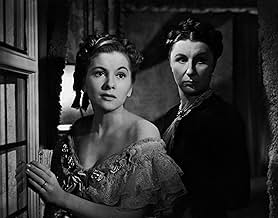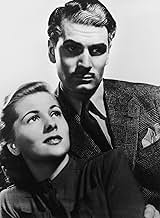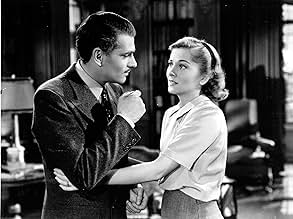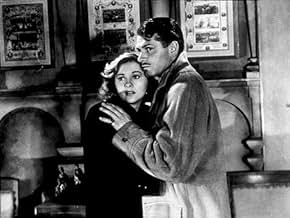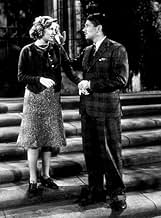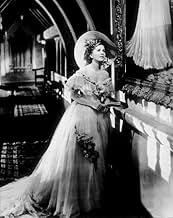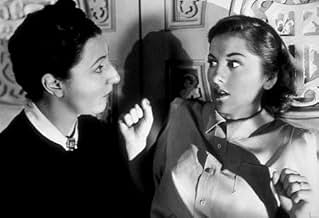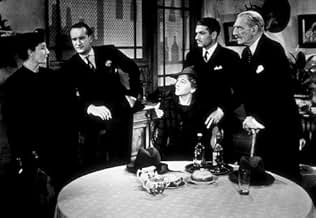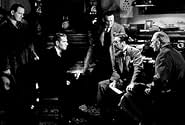Eine selbstbewusste Braut wird von Erinnerungen an die verstorbene, erste Frau ihres zukünftigen Mannes gequält.Eine selbstbewusste Braut wird von Erinnerungen an die verstorbene, erste Frau ihres zukünftigen Mannes gequält.Eine selbstbewusste Braut wird von Erinnerungen an die verstorbene, erste Frau ihres zukünftigen Mannes gequält.
- 2 Oscars gewonnen
- 10 Gewinne & 10 Nominierungen insgesamt
Bunny Beatty
- Maid
- (Nicht genannt)
Billy Bevan
- Policeman
- (Nicht genannt)
Zusammenfassung
Reviewers say 'Rebecca' is acclaimed for its atmospheric storytelling and psychological tension, showcasing Alfred Hitchcock's masterful direction. The film's haunting ambiance, complex characters, and enigmatic Rebecca are highlighted. Key themes include identity, memory, and the struggle of the second Mrs. de Winter. Performances by Joan Fontaine, Laurence Olivier, and Judith Anderson are praised. Cinematography and set design enhance the gothic suspense. Some find the plot uneven and the ending less satisfying, but it remains a significant work in Hitchcock's career.
Empfohlene Bewertungen
Hitchcock felt 'Rebecca', his first Hollywood film, was a compromise, but as a viewer I just can't fault it. It's a masterpiece in my opinion, full of suspense, mystery and brooding atmosphere. It's also one of the most romantic movies I've ever seen. I've watched it several times over the years, and even now that I know all the plot twists and turns (quite shocking on your first viewing), it never fails to hook me in. One of the reasons it really works is the flawless casting. I'm not much of an Olivier fan but he's superb as de Winter, with just the right mixture of charm and coldness. And Joan Fontaine is just perfect as de Winter's new bride. I can't spot an unconvincing moment in her performance and can't imagine any other actress in the role. Hitchcock subsequently used her in 'Suspicion' with Cary Grant. She was also excellent in that but 'Rebecca' is a much stronger movie. The supporting cast also includes some brilliant performances, especially Judith Anderson ('Laura') as the extremely creepy Mrs. Danvers, George Sanders who plays Rebecca's slimy cousin, and Nigel Bruce in a typical role as de Winter's bumbling brother-in-law Major Lacy. Sanders subsequently worked again with Hitchcock in 'Foreign Correspondent', and Bruce played Cary Grant's lovable pal "Beaky" in 'Suspicion'. I sometimes think that Hitchcock's 1940s movies are overlooked by many because they are regarded as being too "old fashioned", but for me movies like 'Suspicion', 'Saboteur', 'Lifeboat' and 'Spellbound' are some of the most entertaining movies Hitchcock ever made, and 'Rebecca' is the best of the lot. If you want to be totally enthralled for two hours just watch 'Rebecca'!
"Rebecca" was the first Hitchcock film I ever saw, and I was mesmerized by it from the start, convinced that I had to see more of the director's work. It richly deserved the Oscar it received, but it's a real puzzle that the Academy saw fit to withhold a best director award for Hitch. Would one possibly give an award to a work by Picasso and not to Picasso himself?
"Rebecca" was the first of the director's American-made films, and it shows. It's quite different from his earlier British-made films, such as "Young and Innocent" and even "The Lady Vanishes," which somehow seem more amateurish by comparison. (I know little of the British cinema of that era, but it's difficult not to conclude that Hollywood was better at producing more sophisticated efforts.) I would even judge "Rebecca" the best of his films of the early 1940s, with the possible exception of "Shadow of a Doubt." It is true, of course, that much of this film has become cliché (remember the spoofs on the old "Carol Burnette Show"!), but it still weathers the decades very well. The acting is uniformly excellent. Olivier is the hardened Maxim de Winter, untitled lord of Manderly, trying to forget the past and given to unexpected bouts of anger and coldheartedness. Fontaine is perfect as the unnamed mousy heroine, innocent yet deeply in love, still carrying with her the aura of an awkward schoolgirl. Even character actor Nigel Bruce, best known for his role in the Sherlock Holmes films, makes an appearance and plays, in effect, Nigel Bruce!
But it is Judith Anderson's role as Mrs. Danvers that viewers are likely to remember best. Her presence is as dark and foreboding as that of the deceased Rebecca herself, and Fontaine is evidently cowed by her icy stare and unnervingly formal manner. The dynamics between the two actresses are wonderful. Who could fail to empathize with Fontaine's unenviable position as, in effect, the new employer of such an intimidating personage? On the other hand, Olivier seems quite unfearful of Anderson, despite her representing so much of the past he is trying to block out. This part of the plot (even in the book) never made much sense to me and is unconvincing.
As far as I know, this film marked Hitch's first collaboration with composer Franz Waxman, whose haunting score makes it all the more memorable. Waxman's scores are perhaps less obviously cinematic than those of the incomparable Bernard Herrmann, who would score Hitch's films from 1955 to 1966. Contrast the score for "Rebecca" to Herrmann's music for "Citizen Kane" the following year, and you'll immediately hear the difference. Waxman's is more symphonic in the central European style reflective of his own birth and upbringing. Yet it is worth recalling that scoring films was still a new art at this time, and both Waxman and Herrmann were pioneers.
Finally, one has to mention the cinematography, which is magnificent. Technically "Rebecca" might have been filmed in colour, which was newly available in 1940. ("Gone with the Wind" was filmed entirely in colour the previous year, while "The Wizzard of Oz" and "The Women" had colour scenes.) But colour would have diminished its impact. The suspense and the ominous sense of impending doom could only have been communicated through the medium of black-and-white and the deft use of light and shade which it affords.
In one respect, of course, "Rebecca" is not a typical Hitchcock film. There is no fleeing innocent trying to clear his name of a crime he did not commit. Surprisingly, there isn't even a murder, although its absence was apparently imposed by the Hayes Code and is certainly foreign to Daphne du Maurier's original novel. Some have said that there is more Selznick than Hitchcock in this film, and perhaps there's something to that. Still, if the collaborative effort between the two was not exactly amiable, it was nevertheless successful.
In short, this is the first in a string of Hitchcock masterpieces.
"Rebecca" was the first of the director's American-made films, and it shows. It's quite different from his earlier British-made films, such as "Young and Innocent" and even "The Lady Vanishes," which somehow seem more amateurish by comparison. (I know little of the British cinema of that era, but it's difficult not to conclude that Hollywood was better at producing more sophisticated efforts.) I would even judge "Rebecca" the best of his films of the early 1940s, with the possible exception of "Shadow of a Doubt." It is true, of course, that much of this film has become cliché (remember the spoofs on the old "Carol Burnette Show"!), but it still weathers the decades very well. The acting is uniformly excellent. Olivier is the hardened Maxim de Winter, untitled lord of Manderly, trying to forget the past and given to unexpected bouts of anger and coldheartedness. Fontaine is perfect as the unnamed mousy heroine, innocent yet deeply in love, still carrying with her the aura of an awkward schoolgirl. Even character actor Nigel Bruce, best known for his role in the Sherlock Holmes films, makes an appearance and plays, in effect, Nigel Bruce!
But it is Judith Anderson's role as Mrs. Danvers that viewers are likely to remember best. Her presence is as dark and foreboding as that of the deceased Rebecca herself, and Fontaine is evidently cowed by her icy stare and unnervingly formal manner. The dynamics between the two actresses are wonderful. Who could fail to empathize with Fontaine's unenviable position as, in effect, the new employer of such an intimidating personage? On the other hand, Olivier seems quite unfearful of Anderson, despite her representing so much of the past he is trying to block out. This part of the plot (even in the book) never made much sense to me and is unconvincing.
As far as I know, this film marked Hitch's first collaboration with composer Franz Waxman, whose haunting score makes it all the more memorable. Waxman's scores are perhaps less obviously cinematic than those of the incomparable Bernard Herrmann, who would score Hitch's films from 1955 to 1966. Contrast the score for "Rebecca" to Herrmann's music for "Citizen Kane" the following year, and you'll immediately hear the difference. Waxman's is more symphonic in the central European style reflective of his own birth and upbringing. Yet it is worth recalling that scoring films was still a new art at this time, and both Waxman and Herrmann were pioneers.
Finally, one has to mention the cinematography, which is magnificent. Technically "Rebecca" might have been filmed in colour, which was newly available in 1940. ("Gone with the Wind" was filmed entirely in colour the previous year, while "The Wizzard of Oz" and "The Women" had colour scenes.) But colour would have diminished its impact. The suspense and the ominous sense of impending doom could only have been communicated through the medium of black-and-white and the deft use of light and shade which it affords.
In one respect, of course, "Rebecca" is not a typical Hitchcock film. There is no fleeing innocent trying to clear his name of a crime he did not commit. Surprisingly, there isn't even a murder, although its absence was apparently imposed by the Hayes Code and is certainly foreign to Daphne du Maurier's original novel. Some have said that there is more Selznick than Hitchcock in this film, and perhaps there's something to that. Still, if the collaborative effort between the two was not exactly amiable, it was nevertheless successful.
In short, this is the first in a string of Hitchcock masterpieces.
This is a Daphne Du Maurier's story (from a best-seller novel) concerning a prominent widower (Laurence Olivier) called Maxim De Winter who finds a gorgeous and timid young girl (Joan Fontaine) who is serving to an old Mistress (Florence Bates) . They are married and head to Manderley , the familiar mansion (in the exterior actually is a scale model). But Maxim is haunted by the ghost first wife , an enigmatic Rebecca , who died in mysterious circumstances . There works as a servant the creepy and obsessive housekeeper , Mrs Danvers (Judith Anderson,a famous stage actress in her most important role) and sh meets a cynic gentleman (George Sanders).
This film has suspense , romance , unlimited tension , full of lingering images and with the typical touches Hitchcock . Besides , a literately and thoughtful dialog signed by Joan Harrison (Hitchcock's usual screenwriter) though lacking humor . After ¨39 steps¨and ¨Jamaica Inn¨ , Hitch was encouraged to go to America and promptly shot his first work in Hollywood hired by the great producer David O'Selznick . Fine performance by Laurence Olivier , he married Vivien Leigh and he wished to her as protagonist but Hitch hired Joan Fontaine who took seven rehearsal sessions until the engaging . Joan Fontaine as a shy bride young is superb and enjoyable . Judith Anderson as a spooky and cold house keeper is top-notch, her role as obsessed person by the glamorous Rebecca is unforgotten and immortal . Atmospheric and perceptible music by Franz Waxman and sensational visual style by the cameraman George Barnes . The picture won Academy Awards for Best film and cinematography . The movie was brilliantly directed by the Master of Suspense . It's remade in inferior versions for Television, the 1980 adaptation with Jeremy Brett as Maxim and 1996 rendition with Charles Dance and Emilie Fox . The motion picture is indispensable watching for Hithcock lovers achieving the maximum impact on his audience.
This film has suspense , romance , unlimited tension , full of lingering images and with the typical touches Hitchcock . Besides , a literately and thoughtful dialog signed by Joan Harrison (Hitchcock's usual screenwriter) though lacking humor . After ¨39 steps¨and ¨Jamaica Inn¨ , Hitch was encouraged to go to America and promptly shot his first work in Hollywood hired by the great producer David O'Selznick . Fine performance by Laurence Olivier , he married Vivien Leigh and he wished to her as protagonist but Hitch hired Joan Fontaine who took seven rehearsal sessions until the engaging . Joan Fontaine as a shy bride young is superb and enjoyable . Judith Anderson as a spooky and cold house keeper is top-notch, her role as obsessed person by the glamorous Rebecca is unforgotten and immortal . Atmospheric and perceptible music by Franz Waxman and sensational visual style by the cameraman George Barnes . The picture won Academy Awards for Best film and cinematography . The movie was brilliantly directed by the Master of Suspense . It's remade in inferior versions for Television, the 1980 adaptation with Jeremy Brett as Maxim and 1996 rendition with Charles Dance and Emilie Fox . The motion picture is indispensable watching for Hithcock lovers achieving the maximum impact on his audience.
Hitchcock's first American movie, a word, American that is, that should be put in quotes because as Hitchcock pointed out, all of the cast and almost all of the crew were British. The film has already garnered so many comments that I'll avoid repeating most of them. The plot I'm sure has been thoroughly outlined and professionally analyzed but a few points are worth emphasis.
The plot of very precisely structured. It consists basically of a man who is the dream of many women in the 1940s audience: ruggedly handsome, intelligent, keen witted, a bit commanding but not too much, fabulously wealthy, a touch roguish, and mysterious. It's the mystery that provides the plot engine. Every incident of his past emotional life needs to be pried out of Maxim deWinter (what a name, suggesting frigidity and distance) as if it were an abcessed tooth. Each secret, as he reveals it, is a surprise to his wife. Except for the final secret uncovered in the plot, which surprises everybody. Maxim could clear the whole mystery up with an hour's worth of private conversation with his wife. But of course he doesn't, or else there would be no story. That's why Hamlet takes so long to slaughter Claudius. And why the Indians don't shoot the horses as they're chasing the stagecoach.
The acting. Olivier is extremely good at impersonating deWinter with all his charm and challenge. George Sanders is the best cad that the movies ever produced, and he proves it again here. Mrs. Danvers has a face and an expression that looks like an ice sculpture. The implicit lesbianism in her character of course had to remain implicit, but it is still rather a shock when she tenderly unfolds Mrs. DeWinter's nightie and says smoothly, "Look, you can see my hand through it." As for Joan Fontaine, a friend in Ireland said of her performance, "She does the shivering wife very well." Precisely put. With her delicate bone structure, fragile looking limbs, and her overall ikabani flower arrangement appearance, her wide asymmetrical eyes, with one brow arching up over her pale forehead, she looks about to faint with fright through half the movie. The only thing coarse about her is her wardrobe: bulky knit sweaters over her girlish bosom, long flapping drab skirts over her small but saucy rump, and those clodhoppers she wears while clunking about the house. She does the shivering naif in at least two other films of the period -- Hitchcock's "Suspicion" and "Jane Eyre." In fact, rummaging through the disarranged attic that is my long-term memory, I can't really remember her "doing" any other role.
It's the closest Hitchcock ever came to making what was then called "a woman's picture." It received a "best picture" Oscar, which went to Selznick. Something Hitchcock seemed to resent for the remainder of his life. It was a commercial and critical success and it deserved to be.
The plot of very precisely structured. It consists basically of a man who is the dream of many women in the 1940s audience: ruggedly handsome, intelligent, keen witted, a bit commanding but not too much, fabulously wealthy, a touch roguish, and mysterious. It's the mystery that provides the plot engine. Every incident of his past emotional life needs to be pried out of Maxim deWinter (what a name, suggesting frigidity and distance) as if it were an abcessed tooth. Each secret, as he reveals it, is a surprise to his wife. Except for the final secret uncovered in the plot, which surprises everybody. Maxim could clear the whole mystery up with an hour's worth of private conversation with his wife. But of course he doesn't, or else there would be no story. That's why Hamlet takes so long to slaughter Claudius. And why the Indians don't shoot the horses as they're chasing the stagecoach.
The acting. Olivier is extremely good at impersonating deWinter with all his charm and challenge. George Sanders is the best cad that the movies ever produced, and he proves it again here. Mrs. Danvers has a face and an expression that looks like an ice sculpture. The implicit lesbianism in her character of course had to remain implicit, but it is still rather a shock when she tenderly unfolds Mrs. DeWinter's nightie and says smoothly, "Look, you can see my hand through it." As for Joan Fontaine, a friend in Ireland said of her performance, "She does the shivering wife very well." Precisely put. With her delicate bone structure, fragile looking limbs, and her overall ikabani flower arrangement appearance, her wide asymmetrical eyes, with one brow arching up over her pale forehead, she looks about to faint with fright through half the movie. The only thing coarse about her is her wardrobe: bulky knit sweaters over her girlish bosom, long flapping drab skirts over her small but saucy rump, and those clodhoppers she wears while clunking about the house. She does the shivering naif in at least two other films of the period -- Hitchcock's "Suspicion" and "Jane Eyre." In fact, rummaging through the disarranged attic that is my long-term memory, I can't really remember her "doing" any other role.
It's the closest Hitchcock ever came to making what was then called "a woman's picture." It received a "best picture" Oscar, which went to Selznick. Something Hitchcock seemed to resent for the remainder of his life. It was a commercial and critical success and it deserved to be.
This fine classic combines a great director, a great story, and a great cast. Any one of those would have made for a good movie, but all three make it an excellent one. Hitchcock's style and eye for detail combine very well with a story (from a novel that is extremely good in its own right) filled with psychological fear and settings that are interesting and suggestive.
Most of the time the story itself moves fairly slowly, allowing the focus to be on the characters, but there are also a couple of very good plot twists, which can be very surprising if you've not seen the movie or read the novel. So if you happen not to know the story, it's a good idea to see the film before reading a lot of comments about it. Laurence Olivier, Joan Fontaine, Judith Anderson, and George Sanders are all perfectly cast and do a wonderful job bringing their characters to life, and making you feel a part of the story.
"Rebecca" should be satisfying not only to any Hitchcock fan, but to anyone who likes classic movies. Whether you like romance, suspense, or drama, they're all here, and put together by a director and cast that are masters of their art.
Most of the time the story itself moves fairly slowly, allowing the focus to be on the characters, but there are also a couple of very good plot twists, which can be very surprising if you've not seen the movie or read the novel. So if you happen not to know the story, it's a good idea to see the film before reading a lot of comments about it. Laurence Olivier, Joan Fontaine, Judith Anderson, and George Sanders are all perfectly cast and do a wonderful job bringing their characters to life, and making you feel a part of the story.
"Rebecca" should be satisfying not only to any Hitchcock fan, but to anyone who likes classic movies. Whether you like romance, suspense, or drama, they're all here, and put together by a director and cast that are masters of their art.
Oscars Best Picture Winners, Ranked
Oscars Best Picture Winners, Ranked
See the complete list of Oscars Best Picture winners, ranked by IMDb ratings.
Wusstest du schon
- WissenswertesOver 20 actresses were screen-tested for the role of Mrs. de Winter, which eventually went to newcomer Joan Fontaine. One of them was Vivien Leigh, for whom Sir Laurence Olivier was pressing, as they were a couple at the time.
- PatzerIn the outside take of Manderley seen in the scene where the Narrator stares at one window being closed, it's a miniature, as is the 'Mrs Danvers' dummy dressed in black. You can realize this by the motion of the window as it's being closed, not in a continuous way, but by little fast jumps, which look too unreal.
- Zitate
[the new Mrs. de Winter wants to dispose of Rebecca's letters]
The Second Mrs. de Winter: I want you to get rid of all these things.
Mrs. Danvers: But these are Mrs. de Winter's things.
The Second Mrs. de Winter: *I* am Mrs. de Winter now!
- Crazy CreditsThe original 1940 credits read "Selznick International presents its picturization of Daphne Du Maurier's 'Rebecca'". The credits on the re-issue version read "The Selznick Studio presents its production of Daphne Du Maurier's 'Rebecca'".
- Alternative VersionenThe opening credits were re-done (with different font) for the 1950's re-release of the movie. It is these credits that have turned up on all telecasts of the film (even as recently as 2013) and all previous video releases. The Criterion release (which is now only available through outlet stores) restores all of the credits to their original form.
- VerbindungenEdited into The Last Tycoon: Pilot (2016)
- SoundtracksLove's Old Sweet Song (Just a Song at Twilight)
(1884) (uncredited)
Music by J.L. Molloy
Hummed by Joan Fontaine
Top-Auswahl
Melde dich zum Bewerten an und greife auf die Watchlist für personalisierte Empfehlungen zu.
Details
Box Office
- Budget
- 1.288.000 $ (geschätzt)
- Weltweiter Bruttoertrag
- 113.328 $
- Laufzeit
- 2 Std. 10 Min.(130 min)
- Farbe
- Seitenverhältnis
- 1.37 : 1
Zu dieser Seite beitragen
Bearbeitung vorschlagen oder fehlenden Inhalt hinzufügen



